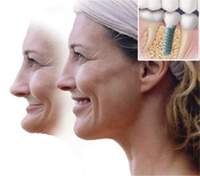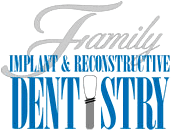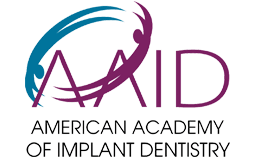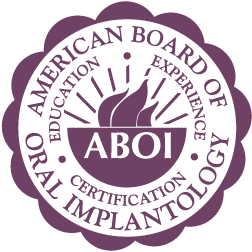Oral Health Not the Best? Dr. Grubb Can Help!
We love seeing patients transform their smiles with dental implants and we are always thrilled when patients come to that exciting decision. However, here at Family Implant & Reconstructive Dentistry, we encourage our patients to use caution because their jaw and oral tissues may not be prepared for dental implants immediately. If this happens, supplemental procedures can sometimes be used to provide the extra help patients need.
How Supplemental Treatments Can Help Your Smile
 There are many great options to fix your oral health issues like bone deterioration or gum recession. Both of these procedures add proper volume to places where dense and healthy tissue is needed. Here are some testimonials of patients just like you. These patients presented special challenges to implant placement and supplemental procedures were able to help their implant provider ensure a successful end result.
There are many great options to fix your oral health issues like bone deterioration or gum recession. Both of these procedures add proper volume to places where dense and healthy tissue is needed. Here are some testimonials of patients just like you. These patients presented special challenges to implant placement and supplemental procedures were able to help their implant provider ensure a successful end result.
Our Supplemental Treatments
Tissue Grafting
During the actual tissue grafting procedure, a small graft of healthy gum tissue is harvested from the patient’s own mouth. Conveniently, this procedure can be performed concurrently with the dental implant placement or before. The order that these procedures are performed will depend on the patient’s health and oral health goals.
After the specially harvested gum graft material is properly placed in the prepared area, the patient will be sent home to heal. The patient should rest and avoid putting any pressure on the graft area. In time, the graft will preserve the soft tissue in the dental implant area and makes the gum tissues less likely to recede after oral surgery.
Sample Patient: Rhonda
Rhonda (whose real name has been altered for privacy), is a 55-year-old female patient with three teeth missing in her top front arch. She lost her teeth almost 20 years ago in an auto accident. After the accident, Rhonda got a dental bridge because it was the quickest and least expensive option. The bridge was fine 20 years ago, but now Rhonda wants to replace her missing teeth with a more permanent and attractive solution. Unfortunately, the tissues around her missing teeth have dramatically receded due to wearing a bridge for so many years. Her doctor determined that she needed tissue grafting before she could get dental implants.
Occasionally, in patients like Rhonda, after years of wearing a bridge, gums can recede, leaving sensitive areas of the root exposed and vulnerable. This can cause greater chances of infection, disease, pain, and decay. So what can be done to combat these? According to dental researchers, tissue grafting has been extremely effective in helping make gums strong, healthy, and resistant to further recession.
Bone Grafting
To combat dangerous bone deterioration and the characteristic flattening of the jawbone after tooth loss, procedures were created to help rebuild healthy jawbone volume. Initially, these procedures were designed to help patients simply wear their dentures and chew enough to eat solid foods. Early attempts at bone grafting used large and dense rib bones. These efforts required extensive hospital stays and painful skin grafts to prevent the displacement of the bone graft when the patient moved, talked, or chewed. The early procedures were usually ineffective, painful, and often unsuccessful.
Thanks to years of thorough research, careful experimentation, and precise clinical patient trials, patients like Jim can get bone or tissue grafting right in the doctor’s office in just a few short visits. If you think you might need bone grafting, the first step is to schedule an appointment to get evaluated.
Sample Patient: Jim
Jim (whose real name has been altered for privacy), is a 64-year-old male patient with most of the teeth in his lower jaw missing. After a biking accident in his late twenties, Jim got dentures because they were the easiest option. Additionally, he wanted to save money and dental implants were not readily available in the area where he lived. Now, Jim discovered that he wants a more permanent, attractive, and functional solution to replace his damaged teeth. However, x-rays revealed that Jim’s jawbone had flattened out over the years. So what can he do now to repair the damage?
Frequently Asked Questions
Do I need to have a supplemental treatment?
You’ll only be recommended a supplemental treatment if your jaw and gum health aren’t sufficient enough to support dental implants. If we don’t address these issues, it’s more likely that your dental implant surgery will fail, putting your smile at risk of further issues such as infection, decay, or possibly even further tooth loss. Your dentist will give you a more comprehensive guide on how supplemental treatments can help.
How long is the recovery period for a supplemental treatment?
The recovery time after your supplemental treatment will depend on the severity of your condition. For patients with extensive damage caused by jaw deterioration or advanced stages of gum disease, it may take longer for their smile to heal before receiving dental implants. Dr. Grubb can provide you with a more accurate timeline after your initial consultation.
What diet changes should I make after a supplemental treatment?
It’s crucial to avoid certain foods and drinks during the first 24 hours following your supplemental procedure. This can include:
- Having hot and cold drinks
- Using a straw or applying any pressure
- Consuming spicy, crunchy, or tough foods
It’s best to eat soft foods like yogurt and applesauce. Additionally, Dr. Grubb recommends not eating until your local anesthetic has worn off to avoid damaging the implant.
Does my insurance cover supplemental procedures?
Most insurance companies will cover a portion of your supplemental procedures, but some won’t cover pre-existing conditions. Our practice recommends contacting your provider to get a detailed understanding of your coverage. If you have any questions, you can also reach out to Dr. Grubb and the team for further financial assistance.
Boost Your Candidacy With Supplemental Treatments
At Family Implant & Reconstructive Dentistry, we see hundreds of patients just like Jim and Rhonda. Despite the excitement involved in fixing smiles, not all patients are immediately ready for dental implants. However, thanks to our supplemental treatments, now you can enjoy all the benefits of permanent and natural-looking tooth replacements. Schedule your visit by calling (410) 939-5800 or filling out our online contact form. We welcome patients in Havre de Grace Heights, Bayview Estates, and Osborne, MD.




